奥巴马纪念曼德拉演讲
奥巴马悼念曼德拉英语演讲稿_演讲稿
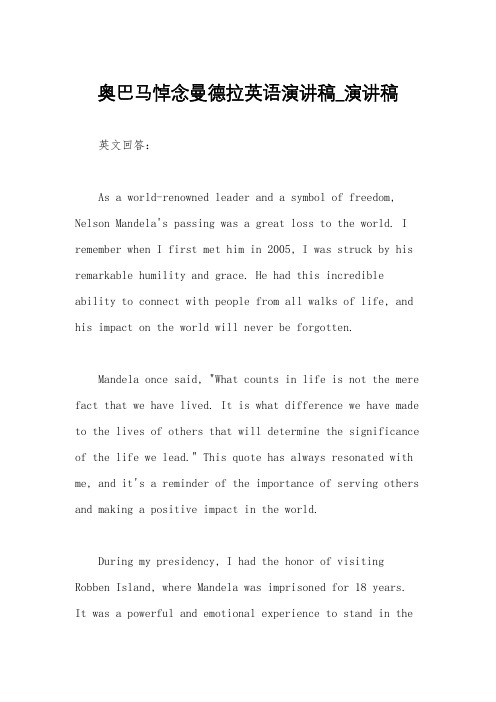
奥巴马悼念曼德拉英语演讲稿_演讲稿英文回答:As a world-renowned leader and a symbol of freedom, Nelson Mandela's passing was a great loss to the world. I remember when I first met him in 2005, I was struck by his remarkable humility and grace. He had this incredibleability to connect with people from all walks of life, and his impact on the world will never be forgotten.Mandela once said, "What counts in life is not the mere fact that we have lived. It is what difference we have made to the lives of others that will determine the significance of the life we lead." This quote has always resonated with me, and it's a reminder of the importance of serving others and making a positive impact in the world.During my presidency, I had the honor of visiting Robben Island, where Mandela was imprisoned for 18 years.It was a powerful and emotional experience to stand in thesame place where he endured so much suffering, yet still emerged with a spirit of forgiveness and reconciliation. Mandela's ability to forgive and unite a divided nation is a testament to his extraordinary character and leadership.中文回答:作为一位享誉世界的领袖和自由的象征,纳尔逊·曼德拉的离世对世界来说是一个巨大的损失。
Obama悼念曼德拉逝世中英文演讲稿
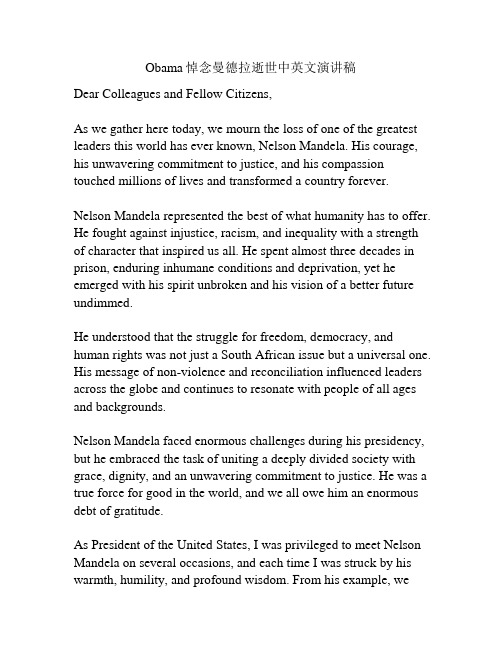
Obama悼念曼德拉逝世中英文演讲稿Dear Colleagues and Fellow Citizens,As we gather here today, we mourn the loss of one of the greatest leaders this world has ever known, Nelson Mandela. His courage, his unwavering commitment to justice, and his compassion touched millions of lives and transformed a country forever.Nelson Mandela represented the best of what humanity has to offer. He fought against injustice, racism, and inequality with a strength of character that inspired us all. He spent almost three decades in prison, enduring inhumane conditions and deprivation, yet he emerged with his spirit unbroken and his vision of a better future undimmed.He understood that the struggle for freedom, democracy, and human rights was not just a South African issue but a universal one. His message of non-violence and reconciliation influenced leaders across the globe and continues to resonate with people of all ages and backgrounds.Nelson Mandela faced enormous challenges during his presidency, but he embraced the task of uniting a deeply divided society with grace, dignity, and an unwavering commitment to justice. He was a true force for good in the world, and we all owe him an enormous debt of gratitude.As President of the United States, I was privileged to meet Nelson Mandela on several occasions, and each time I was struck by his warmth, humility, and profound wisdom. From his example, welearned the power of forgiveness, the importance of building bridges, and the need to confront the darkness in ourselves and in our societies.Nelson Mandela's legacy will continue to inspire us for generations to come. His vision of a world in which all people are treated with dignity and respect, regardless of their race, religion, or background, must always remain our guiding light. We must strive to build on his work, to continue the fight for justice and equality, and to create a better world for all.So let us honor Nelson Mandela's memory by carrying forward his message of hope, courage and love. Let us renew our commitment to the ideals that he so passionately championed and work together to build a brighter future for all.Thank you.。
奥巴马曼德拉演讲2篇

奥巴马曼德拉演讲2篇奥巴马演讲:悼念曼德拉的演讲(第一篇)尊敬的各位嘉宾,亲爱的南非人民,女士们,先生们:今天,我们聚集在这里,纪念一位伟大的领袖、一位永恒的朋友——纳尔逊·曼德拉。
他的离世使整个世界感到失落和悲伤。
他是我国的朋友,也是世界的友人。
我曾有幸多次与他会面,并受到他的深深影响。
他留给我们的遗产将永远激励我们向前迈进。
曼德拉的一生充满了倡导和奋斗,他利用自己的智慧与勇气,打破了南非种族隔离政权的枷锁,为国家实现真正的民主与平等而努力。
他是一个和平的斗士,他的信念让他能够躲过岁月的磨难与困苦,并引领南非走上正确的道路。
曼德拉深刻理解和呼吁团结,他反对分裂和仇恨的种子。
他的理想和努力跨越了种族、国籍和宗教的界限。
他一直致力于推动对话与和解的进程,使得南非成为一个充满朝气和希望的国家。
他将自己置于南非人民的利益之上,以国家的团结和民主为首要目标。
曼德拉所传递的信息是深入人心的。
他告诉我们,我们每个人都有能力改变世界。
他的人生经历证明,即使在最黑暗的时刻,我们也能发现光明的方向。
在他的带领下,南非实现了人类历史上最伟大的转变之一。
他的奋斗与胜利不仅仅影响了南非,也激励了整个世界。
纳尔逊·曼德拉的离世是一次巨大的损失,但他的精神将永远留在我们的心中。
他启发了一代又一代的人,不论他们来自何种背景,他们都受到了他的教诲。
他的故事将继续激励着未来的领袖和改变者。
让我们纪念曼德拉的勇气,他对自由和正义的执着。
他的理念将给世界上其他地方的人们带来希望,鼓励他们为正义和和平奋斗。
曼德拉的一生是一份珍贵的礼物,他的离世是我们共同的损失。
现在,我们必须牢记他的遗产,并继续为曼德拉的梦想而奋斗。
谢谢大家。
奥巴马演讲:继续曼德拉的梦想(第二篇)亲爱的朋友们:我们聚集在一起,悼念并纪念曼德拉的一生和他所代表的理念。
他在地球上的存在成为了世界的人们憧憬与追逐的目标。
他的离世使世界陷入了沉思与反思。
曼德拉是一位伟大的领袖,他向我们展示了斗争和希望的力量。
Obama悼念曼德拉逝世中英文演讲稿
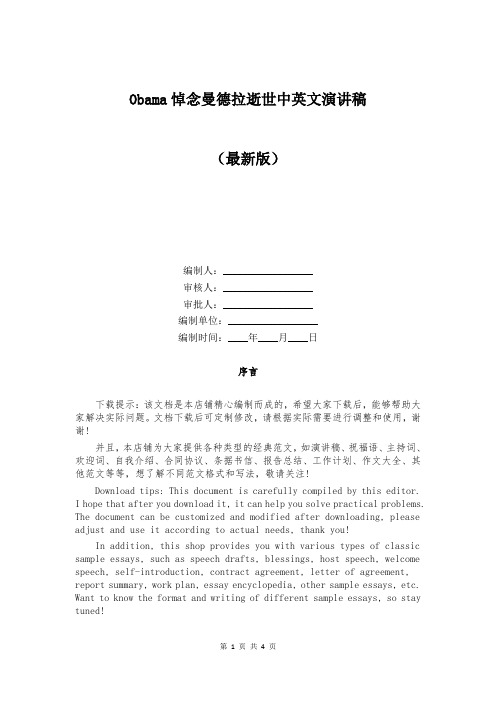
Obama悼念曼德拉逝世中英文演讲稿(最新版)编制人:__________________审核人:__________________审批人:__________________编制单位:__________________编制时间:____年____月____日序言下载提示:该文档是本店铺精心编制而成的,希望大家下载后,能够帮助大家解决实际问题。
文档下载后可定制修改,请根据实际需要进行调整和使用,谢谢!并且,本店铺为大家提供各种类型的经典范文,如演讲稿、祝福语、主持词、欢迎词、自我介绍、合同协议、条据书信、报告总结、工作计划、作文大全、其他范文等等,想了解不同范文格式和写法,敬请关注!Download tips: This document is carefully compiled by this editor.I hope that after you download it, it can help you solve practical problems. The document can be customized and modified after downloading, please adjust and use it according to actual needs, thank you!In addition, this shop provides you with various types of classic sample essays, such as speech drafts, blessings, host speech, welcome speech, self-introduction, contract agreement, letter of agreement, report summary, work plan, essay encyclopedia, other sample essays, etc. Want to know the format and writing of different sample essays, so stay tuned!Obama悼念曼德拉逝世中英文演讲稿At his trial in 1964, Nelson Mandela closed his statement from the dock saying, "I have fought against white domination, and I have fought against black domination. I have cherished the ideal of a democratic and free society in which all persons live together in harmony and with equal opportunities. It is an ideal which I hope to live for and to achieve. But if needs be, it is an ideal for which I am prepared to die."And Nelson Mandela lived for that ideal, and he made it real. He achieved more than could be expected of any man. Today, he has gone home. And we have lost one of the most influential, courageous, and profoundly good human beings that any of us will share time with on this Earth. He no longer belongs to us -- he belongs to the ages.Through his fierce dignity and unbending will to sacrifice his own freedom for the freedom of others, Madiba transformed South Africa -- and moved all of us. His journey from a prisoner to a President embodied the promise that human beings -- and countries -- can change for the better. His commitment to transfer power and reconcile with those who jailed him set an example that all humanity should aspire to, whether in the livesof nations or our own personal lives. And the fact that he did it all with grace and good humor, and an ability to acknowledge his own imperfections, only makes the man that much more remarkable. As he once said, "I am not a saint, unless you think of a saint as a sinner who keeps on trying."I am one of the countless millions who drew inspiration from Nelson Mandela's life. My very first political action, the first thing I ever did that involved an issue or a policy or politics, was a protest against apartheid. I studied his words and his writings. The day that he was released from prison gave me a sense of what human beings can do when they’re guided by their hopes and not by their fears. And like so many around the globe, I cannot fully imagine my own life without the example that Nelson Mandela set, and so long as I live I will do what I can to learn from him.To Graa Machel and his family, Michelle and I extend our deepest sympathy and gratitude for sharing this extraordinary man with us. His life’s work meant long days away from those who loved him the most. And I only hope that the time spent with him these last few weeks brought peace and comfort to his family.To the people of South Africa, we draw strength from the example of renewal, andreconciliation, and resilience that youmade real. A free South Africa at peace with itself -- that’s an example to the world, and that’s Madiba’s legacy to the nation he loved.We will not likely see the likes of Nelson Mandela again. So it falls to us as best we can to forward the example that he set: to make decisions guided not by hate, but by love; to never discount the difference that one person can make; to strive for a future that is worthy of his sacrifice.For now, let us pause and give thanks for the fact that Nelson Mandela lived -- a man who took history in his hands, and bent the arc of the moral universe toward justice. May God Bless his memory and keep him in peace.。
演讲致辞-奥巴马悼念曼德拉逝世中英文演讲稿 精品
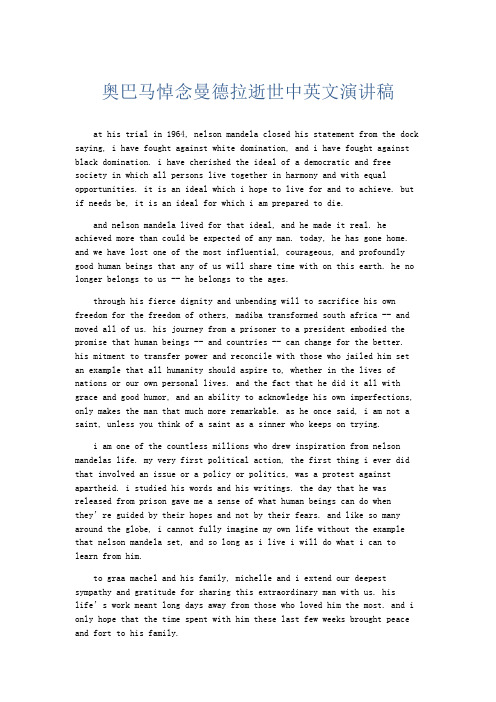
奥巴马悼念曼德拉逝世中英文演讲稿at his trial in 1964, nelson mandela closed his statement from the dock saying, i have fought against white domination, and i have fought against black domination. i have cherished the ideal of a democratic and free society in which all persons live together in harmony and with equal opportunities. it is an ideal which i hope to live for and to achieve. but if needs be, it is an ideal for which i am prepared to die.and nelson mandela lived for that ideal, and he made it real. he achieved more than could be expected of any man. today, he has gone home. and we have lost one of the most influential, courageous, and profoundly good human beings that any of us will share time with on this earth. he no longer belongs to us -- he belongs to the ages.through his fierce dignity and unbending will to sacrifice his own freedom for the freedom of others, madiba transformed south africa -- and moved all of us. his journey from a prisoner to a president embodied the promise that human beings -- and countries -- can change for the better. his mitment to transfer power and reconcile with those who jailed him set an example that all humanity should aspire to, whether in the lives of nations or our own personal lives. and the fact that he did it all with grace and good humor, and an ability to acknowledge his own imperfections, only makes the man that much more remarkable. as he once said, i am not a saint, unless you think of a saint as a sinner who keeps on trying.i am one of the countless millions who drew inspiration from nelson mandelas life. my very first political action, the first thing i ever did that involved an issue or a policy or politics, was a protest against apartheid. i studied his words and his writings. the day that he was released from prison gave me a sense of what human beings can do when they’re guided by their hopes and not by their fears. and like so many around the globe, i cannot fully imagine my own life without the example that nelson mandela set, and so long as i live i will do what i can to learn from him.to graa machel and his family, michelle and i extend our deepest sympathy and gratitude for sharing this extraordinary man with us. his life’s work meant long days away from those who loved him the most. and i only hope that the time spent with him these last few weeks brought peace and fort to his family.to the people of south africa, we draw strength from the example of renewal, andreconciliation, and resilience that you made real. a free south africa at peace with itself -- that’s an example to the world, and that’s madiba’s legacy to the nation he loved.we will not likely see the likes of nelson mandela again. so it falls to us as best we can to forward the example that he set: to make decisions guided not by hate, but by love; to never discount the difference that one person can make; to strive for a future that is worthy of his sacrifice.for now, let us pause and give thanks for the fact that nelson mandela lived -- a man who took history in his hands, and bent the arc of the moral universe toward justice. may god bless his memory and keep him in peace.:大学生英语演讲稿中英文:荣誉的标志大学生英语演讲稿(中英文对照)英语演讲稿中英文:青年人荣誉的标志奥巴马感恩节英语演讲稿(中英文)大学英语三分钟演讲稿中英文对照中英文演讲稿的格式感恩节演讲稿(中英文)奥巴马2019年感恩节演讲稿(中英文)中英文演讲稿:与巨大能力同来的是巨大的责任中英文竞聘词2019年05月20日。
美国总统奥巴马在曼德拉悼念活动中致辞
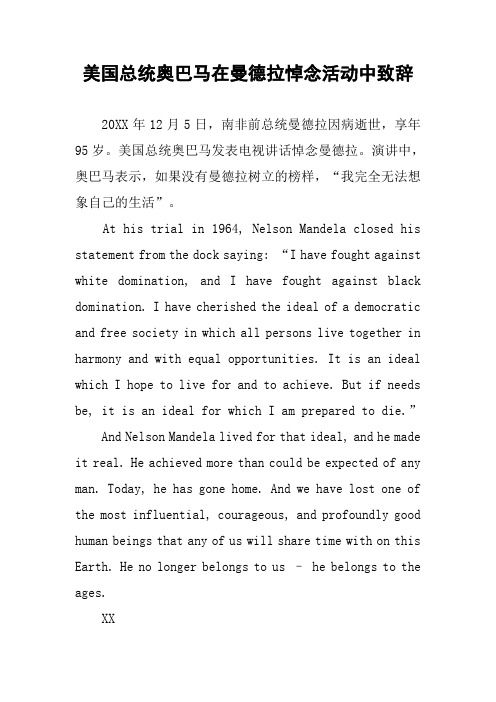
美国总统奥巴马在曼德拉悼念活动中致辞20XX年12月5日,南非前总统曼德拉因病逝世,享年95岁。
美国总统奥巴马发表电视讲话悼念曼德拉。
演讲中,奥巴马表示,如果没有曼德拉树立的榜样,“我完全无法想象自己的生活”。
At his trial in 1964, Nelson Mandela closed his statement from the dock saying: “I have fought against white domination, and I have fought against black domination. I have cherished the ideal of a democratic and free society in which all persons live together in harmony and with equal opportunities. It is an ideal which I hope to live for and to achieve. But if needs be, it is an ideal for which I am prepared to die.”And Nelson Mandela lived for that ideal, and he made it real. He achieved more than could be expected of any man. Today, he has gone home. And we have lost one of the most influential, courageous, and profoundly good human beings that any of us will share time with on this Earth. He no longer belongs to us – he belongs to the ages.XXThrough his fierce dignity and unbending will to sacrifice his own freedom for the freedom of others, Madiba transformed South Africa – and moved all of us. His journey from a prisoner to a president embodied the promise that human beings –and countries –can change for the better.His mitment to transfer power and reconcile with those who jailed him set an example that all humanity should aspire to, whether in the lives of nations or our own personal lives. And the fact that he did it all with grace and good humour, and an ability to acknowledge his own imperfections, only makes the man that much more remarkable. As he once said, “I am not a saint, unless you think of a saint as a sinner who keeps on trying.”I am one of the countless millions who drew inspiration from Nelson Mandela’s life. My very first political action, the first thing I ever did that involved an issue or a policy or politics, was a protest against apartheid. I studied his words and his writings. The day that he was released from prison gave me a sense of what human beings can do when they’re guided by theirhopes and not by their fears. And like so many around the globe, I cannot fully imagine my own life without the example that Nelson Mandela set, and so long as I live I will do what I can to learn from him.XXTo Graca Machel and his family, Michelle and I extend our deepest sympathy and gratitude for sharing this extraordinary man with us. His life’s work meant long days away from those who loved him the most. And I only hope that the time spent with him these last few weeks brought peace and fort to his family.To the people of South Africa, we draw strength from the example of renewal, and reconciliation, and resilience that you made real. A free South Africa at peace with itself – that’s an example to the world, and that’s Madiba’s legacy to the nation he loved.We will not likely see the likes of Nelson Mandela again. So it falls to us as best we can to forward the example that he set: to make decisions guided not by hate, but by love; to never discount the difference that one person can make; to strive for a future that is worthy of his sacrifice.For now, let us pause and give thanks for the fact that Nelson Mandela lived – a man who took history in his hands, and bent the arc of the moral universe toward justice. May God bless his memory and keep him in peace.XX。
奥巴马在曼德拉葬礼上的讲话和译文

奥巴马在曼德拉葬礼上的讲话和译文Remarks by President Obama at Memorial Service for Former South African President Nelson Mandela奥巴马总统在悼念南非前总统纳尔逊?曼德拉的仪式上的讲话First National Bank Stadium, Johannesburg, South Africa第一国家银行体育场,南非,约翰内斯堡December 10, 20132013年12月10日Thank you. (Applause.) Thank you so much. Thank you. To Gra?a Machel and the Mandela family; to President Zuma and members of the government; to heads of states and government, past and present; distinguished guests -- it is a singular honor to be with you today, to celebrate a life like no other. To the people of South Africa -- (applause) -- people of every race and walk of life -- the world thanks you for sharing Nelson Mandela with us. His struggle was your struggle. His triumph was your triumph. Your dignity and your hope found expression in his life. And your freedom, your democracy is his cherished legacy.谢谢诸位。
Obama悼念曼德拉逝世中英文演讲稿
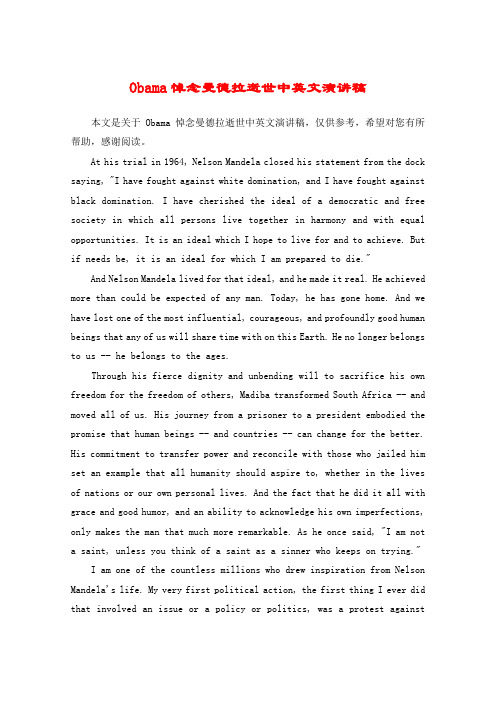
Obama悼念曼德拉逝世中英文演讲稿本文是关于Obama悼念曼德拉逝世中英文演讲稿,仅供参考,希望对您有所帮助,感谢阅读。
At his trial in 1964, Nelson Mandela closed his statement from the dock saying, "I have fought against white domination, and I have fought against black domination. I have cherished the ideal of a democratic and free society in which all persons live together in harmony and with equal opportunities. It is an ideal which I hope to live for and to achieve. But if needs be, it is an ideal for which I am prepared to die."And Nelson Mandela lived for that ideal, and he made it real. He achieved more than could be expected of any man. Today, he has gone home. And we have lost one of the most influential, courageous, and profoundly good human beings that any of us will share time with on this Earth. He no longer belongs to us -- he belongs to the ages.Through his fierce dignity and unbending will to sacrifice his own freedom for the freedom of others, Madiba transformed South Africa -- and moved all of us. His journey from a prisoner to a president embodied the promise that human beings -- and countries -- can change for the better. His commitment to transfer power and reconcile with those who jailed him set an example that all humanity should aspire to, whether in the lives of nations or our own personal lives. And the fact that he did it all with grace and good humor, and an ability to acknowledge his own imperfections, only makes the man that much more remarkable. As he once said, "I am not a saint, unless you think of a saint as a sinner who keeps on trying."I am one of the countless millions who drew inspiration from Nelson Mandela's life. My very first political action, the first thing I ever did that involved an issue or a policy or politics, was a protest againstapartheid. I studied his words and his writings. The day that he was released from prison gave me a sense of what human beings can do when they’re guided by their hopes and not by their fears. And like so many around the globe, I cannot fully imagine my own life without the example that Nelson Mandela set, and so long as I live I will do what I can to learn from him.To Graa Machel and his family, Michelle and I extend our deepest sympathy and gratitude for sharing this extraordinary man with us. His life’s work meant long days away from those who loved him the most. And I only hope that the time spent with him these last few weeks brought peace and comfort to his family.To the people of South Africa, we draw strength from the example of renewal, andreconciliation, and resilience that you made real. A free South Africa at peace with itself -- that’s an example to the world, and that’s Madiba’s legacy to the nation he loved.We will not likely see the likes of Nelson Mandela again. So it falls to us as best we can to forward the example that he set: to make decisions guided not by hate, but by love; to never discount the difference that one person can make; to strive for a future that is worthy of his sacrifice.For now, let us pause and give thanks for the fact that Nelson Mandela lived -- a man who took history in his hands, and bent the arc of the moral universe toward justice. May God Bless his memory and keep him in peace.。
美国总统奥巴马在曼德拉追悼会上的致辞
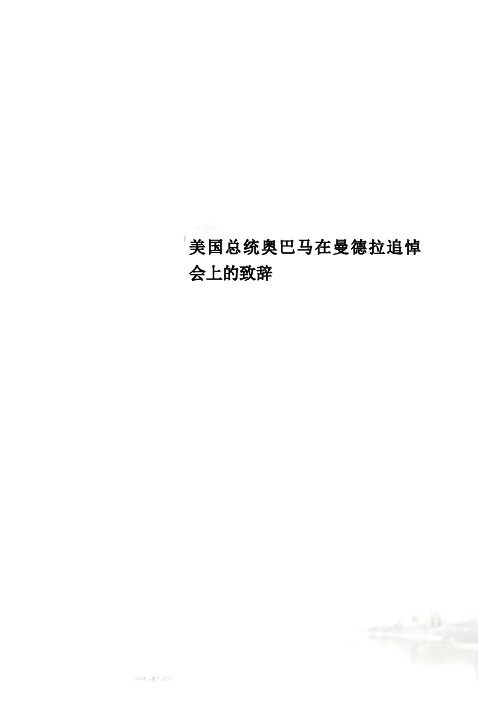
美国总统奥巴马在曼德拉追悼会上的致辞美国总统奥巴马在曼德拉追悼会上的致辞谢谢各位!非常感谢大家!首先我想向曼德拉家族成员、祖马总统、尊敬的各位各国的代表们、尊敬的各位嘉宾,我觉得我今天非常荣幸在此参加曼德拉的追悼会,来纪念这一个卓越非凡的人。
各位南非的人民们,来自各行各业的人,全世界感谢你们,让你们的国度诞生了曼德拉这位伟人,他的一生是伟大的一生,是你们的尊容。
而他为你们获得了自由和民主,这是他留下的宝贵财富。
我们现在难以用言语去表达我们对曼德拉的热爱,很难用一些数据、事实去描绘一个人的一生。
我们用很多不同的事让我们心意相连。
在这个艰难的时刻,在历史的重要时刻,我们要让一个国家走向正义是需要突破艰难险阻的。
在一家之中出生,生于权利之家,他在部落里面成长起来。
曼德拉是20世纪最伟大的自由的斗士,而他引领了反非自由运动,而这个运动也获得了成功。
就像马丁.路德.金博士一样,他代表那些被压迫的人们发出了声音,引领他们追求正义。
而他忍受了监狱的苦难,忍受了不幸和磨难,而直到冷战终结。
在他从监狱获得自由之后,他把国家又重新团结起来,就像林肯总统那样,他是国家的缔造者,他为下一代人建立了自由的基础。
而他为国家塑造起来了民主和法治的基础,而且在一任总统任期之后就自愿选择从权利的高位下退出。
在他的一生当中他取得了辉煌的成就。
我们记得曼德拉是我们的偶像,是我们的领袖,他永远带着微笑,但同时他又是坚强的自强不息的斗士。
但是曼德拉也与我们分享他的疑惑,还有在他的一些光辉成就当中的疑虑。
他说,如果你觉得所谓的圣人就是虽然犯错但是永不放弃的人,而他也承认他的不完美。
他有着幽默感,即使他身负重担但是仍然微笑着面对生活。
他是有血有肉的真实的一个人,有着自己的情感,他既是一位导师,又是我们亲密的朋友,这是我们为什么从他身上学习到如此多的东西。
他的成就是卓越的,是无与伦比的,在他的一生当中我们看到了他不屈不挠的斗争,他的勇气、信仰、耐心和坚持,他向我们展示了人类的潜力,不仅是历史上一些光辉的章节,而是我们看到的实实在在的成就,他也让我们看到了行动的力量。
奥巴马悼念曼德拉英语演讲稿演讲稿
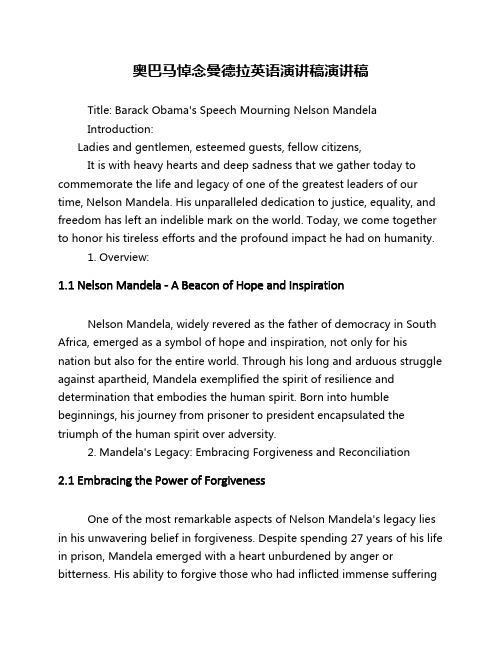
奥巴马悼念曼德拉英语演讲稿演讲稿Title: Barack Obama's Speech Mourning Nelson MandelaIntroduction:Ladies and gentlemen, esteemed guests, fellow citizens,It is with heavy hearts and deep sadness that we gather today to commemorate the life and legacy of one of the greatest leaders of our time, Nelson Mandela. His unparalleled dedication to justice, equality, and freedom has left an indelible mark on the world. Today, we come together to honor his tireless efforts and the profound impact he had on humanity.1. Overview:1.1 Nelson Mandela - A Beacon of Hope and InspirationNelson Mandela, widely revered as the father of democracy in South Africa, emerged as a symbol of hope and inspiration, not only for his nation but also for the entire world. Through his long and arduous struggle against apartheid, Mandela exemplified the spirit of resilience and determination that embodies the human spirit. Born into humble beginnings, his journey from prisoner to president encapsulated the triumph of the human spirit over adversity.2. Mandela's Legacy: Embracing Forgiveness and Reconciliation2.1 Embracing the Power of ForgivenessOne of the most remarkable aspects of Nelson Mandela's legacy lies in his unwavering belief in forgiveness. Despite spending 27 years of his life in prison, Mandela emerged with a heart unburdened by anger or bitterness. His ability to forgive those who had inflicted immense sufferingupon him and his people touched the core of humanity, reminding us that forgiveness is a powerful force that has the potential to heal even the deepest wounds.2.2 Emphasizing the Importance of ReconciliationThroughout his presidency, Mandela emphasized the significance of reconciliation, fostering unity among the diverse communities in South Africa. Rather than seeking revenge or retribution, he advocated for a collective effort to bridge the gaps that divided the nation. By promoting dialogue, understanding, and compassion, he transformed the narrative ofa divided nation into one of solidarity and progress.3. Lessons from Mandela's Journey: Perseverance and Leadership3.1 Perseverance in the Face of AdversityNelson Mandela's journey serves as a testament to the power of perseverance. He endured countless setbacks, including imprisonment, yet never wavered in his commitment to justice and equality. His unwavering dedication to his cause serves as a source of inspiration for all who face obstacles on their path toward creating a better world.3.2 Leadership Anchored in IntegrityLeadership, as embodied by Nelson Mandela, rests on a foundation of unwavering integrity. His moral compass guided him through the darkest times, enabling him to make decisions that transcended personal gains and focused on the greater good. Mandela's leadership style serves as a reminder that true leadership is not about the position one holds but about the values and principles one upholds.Conclusion:As we bid farewell to Nelson Mandela, let us strive to keep his spirit alive within our own lives. Let us be inspired by his unwavering commitment to justice and equality. May we adopt his values of forgiveness, reconciliation, perseverance, and leadership, as we work together to build a world that is guided by compassion, understanding, and respect for all. Finally, let us honor his legacy by continuing the journey towards the realization of a more just and equitable society.Thank you.。
奥巴马对曼德拉的悼词-
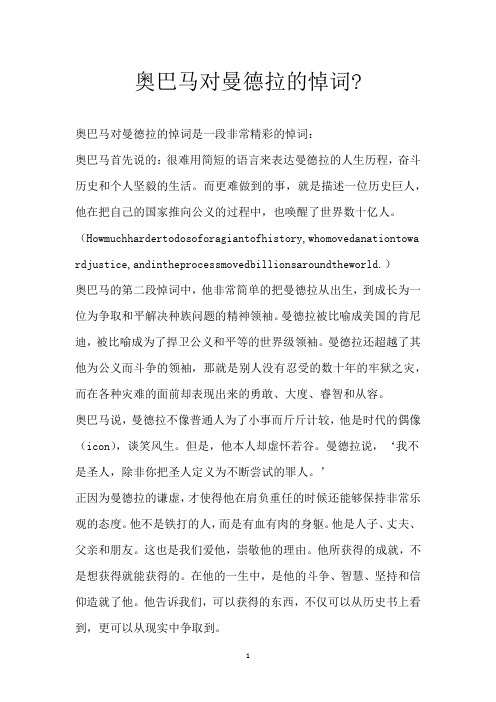
奥巴马对曼德拉的悼词?奥巴马对曼德拉的悼词是一段非常精彩的悼词:奥巴马首先说的:很难用简短的语言来表达曼德拉的人生历程,奋斗历史和个人坚毅的生活。
而更难做到的事,就是描述一位历史巨人,他在把自己的国家推向公义的过程中,也唤醒了世界数十亿人。
(Howmuchhardertodosoforagiantofhistory,whomovedanationtowa rdjustice,andintheprocessmovedbillionsaroundtheworld.)奥巴马的第二段悼词中,他非常简单的把曼德拉从出生,到成长为一位为争取和平解决种族问题的精神领袖。
曼德拉被比喻成美国的肯尼迪,被比喻成为了捍卫公义和平等的世界级领袖。
曼德拉还超越了其他为公义而斗争的领袖,那就是别人没有忍受的数十年的牢狱之灾,而在各种灾难的面前却表现出来的勇敢、大度、睿智和从容。
奥巴马说,曼德拉不像普通人为了小事而斤斤计较,他是时代的偶像(icon),谈笑风生。
但是,他本人却虚怀若谷。
曼德拉说,‘我不是圣人,除非你把圣人定义为不断尝试的罪人。
’正因为曼德拉的谦虚,才使得他在肩负重任的时候还能够保持非常乐观的态度。
他不是铁打的人,而是有血有肉的身躯。
他是人子、丈夫、父亲和朋友。
这也是我们爱他,崇敬他的理由。
他所获得的成就,不是想获得就能获得的。
在他的一生中,是他的斗争、智慧、坚持和信仰造就了他。
他告诉我们,可以获得的东西,不仅可以从历史书上看到,更可以从现实中争取到。
奥巴马接着说,‘曼德拉给我们展现行动的力量,为了实现理想而冒险的力量。
’‘跟非洲国民议会的其他领袖一样,曼德拉控制住怒火,把奋斗的愿望通过有效的组织、平台和战略行动。
他更加知道,为了争取公义,必须面对强有力的利益集团,所以,他的行动必然要付出代价。
’1964年,曼德拉在接受审判的时候是这样说的‘我极力主张一个自由、民主的社会,在这个社会里,所有的人都可以和睦相处,享受平等的机会。
Obama悼念曼德拉逝世中英文演讲稿

Obama悼念曼德拉逝世中英文演讲稿中文演讲稿:亲爱的朋友们,我今天站在这里,向你们传达一个悲伤的消息。
尼尔森·曼德拉先生,南非的伟大人物和全球的象征,已经离世。
曼德拉先生是一位非凡的领袖,他用自己的生命彰显了人权、平等和和平的精神。
他在长达27年的监禁中没有丧失自己的信念,而是继续奋斗,不懈努力争取自由。
他的勇气和毅力将永远激励着我们。
曼德拉先生是南非历史上的一位伟大的反种族隔离斗士,他带领着南非人民争取自由和平等的斗争。
他的付出和努力将南非从独裁和分离带向和解和团结。
他的领导才华和智慧将永远被人们铭记。
曼德拉先生所代表的不仅仅是南非,而是整个非洲和世界。
他的故事和他的追求成了全球人权和社会正义的象征。
他给我们展示了什么是真正的领导力和无私奉献,他的精神将永远鼓舞着我们。
他的离世是一次巨大的损失,但他的遗产将永远活在我们心中。
我们应该记住曼德拉先生的故事,并将其作为我们行动的指南。
我们必须继续推动自由、平等和和平的价值观,为我们的社会和国家做出积极的改变。
曼德拉先生的离世是一个提醒,提醒我们应该珍惜和平与和解。
我们必须继续努力消除分裂和仇恨,建立一个更加公正和平等的世界。
让我们一起悼念这位非凡的领袖,让我们一起追求他所倡导的正义和和平。
让我们永远铭记曼德拉先生,他将永远活在我们心中。
谢谢大家。
英文演讲稿:Ladies and gentlemen,I stand before you today to deliver some sad news. Nelson Mandela, a great figure in South Africa and a global symbol, has passed away.Mr. Mandela was an extraordinary leader who embodied the spirit of human rights, equality, and peace. Despite spending 27 years in prison, he never wavered in his beliefs and continued his fight tirelessly for freedom. His courage and resilience will forever inspire us.Mr. Mandela was a great anti-apartheid fighter in South African history, leading the people of South Africa in the struggle for freedom and equality. His sacrifices and efforts led South Africa from tyranny and division to reconciliation and unity. His leadership and wisdom will always be remembered.Mr. Mandela represented not only South Africa but also the whole of Africa and the world. His story and his quest became a symbol of global human rights and social justice. He showed us what true leadership and selflessness mean, and his spirit will forever uplift us.His passing is a great loss, but his legacy will live on in our hearts. We should remember Mr. Mandela's story and take it as a guide for our actions. We must continue to promote the values of freedom, equality, and peace and make positive changes in our societies and countries.Mr. Mandela's passing is a reminder for us to cherish peace and reconciliation. We must continue to strive to eliminate division and hatred and build a more just and equal world.Let us mourn this extraordinary leader together, and let us pursue the justice and peace he advocated for. Let us remember Nelson Mandela forever, as he will live on in our hearts.Thank you all.。
奥巴马对于曼德拉去世的演讲
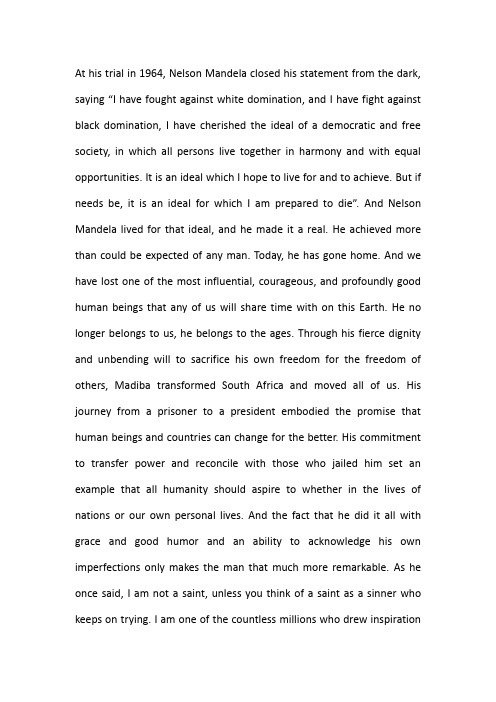
At his trial in 1964, Nelson Mandela closed his statement from the dark, saying “I have fought against white domination, and I have fight against black domination, I have cherished the ideal of a democratic and free society, in which all persons live together in harmony and with equal opportunities. It is an ideal which I hope to live for and to achieve. But if needs be, it is an ideal for which I am prepared to die”. And Nelson Mandela lived for that ideal, and he made it a real. He achieved more than could be expected of any man. Today, he has gone home. And we have lost one of the most influential, courageous, and profoundly good human beings that any of us will share time with on this Earth. He no longer belongs to us, he belongs to the ages. Through his fierce dignity and unbending will to sacrifice his own freedom for the freedom of others, Madiba transformed South Africa and moved all of us. His journey from a prisoner to a president embodied the promise that human beings and countries can change for the better. His commitment to transfer power and reconcile with those who jailed him set an example that all humanity should aspire to whether in the lives of nations or our own personal lives. And the fact that he did it all with grace and good humor and an ability to acknowledge his own imperfections only makes the man that much more remarkable. As he once said, I am not a saint, unless you think of a saint as a sinner who keeps on trying. I am one of the countless millions who drew inspirationfrom Nelson Mandela’s life. My very first political action, the first thing I ever did that involved an issue or a policy or politics was a protest against apartheid, I studied his words and his writings. The day that he was released from prison gave me s sense of what human beings can do when they’re guided by their hopes and not by their fears. And like so many around the globe, I cannot fully imagine my own life without the example that Nelson Mandela set. And so long as I live, I will do what I can to learn from him. To Mechel and his family, Michelle and I extend our deepest sympathy and gratitude for sharing this extraordinary man with us. His life’s work meant long days away from those who loved him the most. And I only hope that the time spent with him these last few weeks brought peace and comfort to his family. To the people of South Africa, we draw strength from the example of renewal and reconciliation and resilience that you made real. A free South Africa at peace with itself, that’s an example to the world and that’s Madiba’s legacy to the nation he loved. We will not likely see the likes of Mandela again, so it falls to us as best we can to forward the example that he set: to make decisions guided not by hate, but by love, to never discount the difference that one person can make, to strive for a future that is worthy of his sacrifice. For now, let us pause and give thanks for the fact that Mandela lived, a man who took history in his hands, and bent the arc of moral universe toward justice. May God bless his memory and keep him in peace.。
奥巴马悼念曼德拉逝世中英文演讲稿

奥巴马悼念曼德拉逝世中英文演讲稿英文演讲稿Dear fellow citizens,Around the world today, millions of people are remembering and honoring Nelson Mandela. They are remembering not just the man, but the movement that he came to represent.Today, I join others in mourning his passing and giving thanks for his life.We remember the countless people, including so many of our grandparents, who fought for freedom alongside Mandela, and we honor the leadership of his partner in the struggle against apartheid, Graça Machel.And so, we will remember him as a man who took history in his hands and bent the arc of the moral universe toward justice.May we all draw inspiration from Nelson Mandela’s example, and act on behalf of justice, equality, and peace.May God bless the memory of Nelson Mandela, and may God bless the people of his beloved South Africa.中文演讲稿亲爱的同胞们,今天,全世界无数人在怀念并纪念曼德拉。
- 1、下载文档前请自行甄别文档内容的完整性,平台不提供额外的编辑、内容补充、找答案等附加服务。
- 2、"仅部分预览"的文档,不可在线预览部分如存在完整性等问题,可反馈申请退款(可完整预览的文档不适用该条件!)。
- 3、如文档侵犯您的权益,请联系客服反馈,我们会尽快为您处理(人工客服工作时间:9:00-18:30)。
Remarks by President Obama at Memorial Service for Former South African President Nelson Mandela ,First National Bank Stadium, Johannesburg, SouthAfricaDecember 10, 2013Thank you. Thank you so much. Thank you. To GraçaMachel and the Mandela family; to President Zuma and members of the government; to heads of states and government, past and present; distinguished guests -- it is a singular honor to be with you today, to celebrate a life like no other. To the people of South Africa -- -- people of every race and walk of life -- the world thanks you for sharing Nelson Mandela with us. His struggle was your struggle. His triumph was your triumph. Your dignity and your hope found expression in his life. And your freedom, your democracy is his cherished legacy.It is hard to eulogize any man -- to capture in words not just the facts and the dates that make a life, but the essential truth of a person -- their private joys and sorrows; the quiet moments and unique qualities that illumi nate someone’s soul. How much harder to do so for a giant of history, who moved a nation toward justice, and in the process moved billions around the world.Born during World War I, far from the corridors of power, a boy raised herding cattle and tutored by the elders of his Thembu tribe, Madiba would emerge as the last great liberator of the 20th century. Like Gandhi, he would lead a resistance movement -- a movement that at its start had little prospect for success. Like Dr. King, he would give potent voice to the claims of the oppressed and the moral necessity of racial justice. He would endure a brutal imprisonment that began in the time of Kennedy and Khrushchev, and reached the final days of the Cold War. Emerging from prison, without the force of arms, he would -- like Abraham Lincoln -- hold his country together when it threatened to break apart. And like America’s Founding Fathers, he would erect a constitutional order to preserve freedom for future generations -- a commitment to democracy and rule of law ratified not only by his election, but by his willingness to step down from power after only one term.Given the sweep of his life, the scope of his accomplishments, the adoration that he so rightly earned, it’s tempting I think to remember Nelson Ma ndela as an icon, smiling and serene, detached from the tawdry affairs of lesser men. But Madiba himself strongly resisted such a lifeless portrait. Instead, Madiba insisted on sharing with us his doubts and his fears; his miscalculations along with his vi ctories. “I am not a saint,” he said, “unless you think of a saint as a sinner who keeps on trying.”It was precisely because he could admit to imperfection -- because he could be sofull of good humor, even mischief, despite the heavy burdens he carried -- that we loved him so. He was not a bust made of marble; he was a man of flesh and blood -- a son and a husband, a father and a friend. And that’s why we learned so much from him, and that’s why we can learn from him still. For nothing he achieved was ine vitable. In the arc of his life, we see a man who earned his place in history through struggle and shrewdness, and persistence and faith. He tells us what is possible not just in the pages of history books, but in our own lives as well.Mandela showed us the power of action; of taking risks on behalf of our ideals. Perhaps Madiba was right that he inherited, “a proud rebelliousness, a stubborn sense of fairness” from his father. And we know he shared with millions of black and colored South Africans the ang er born of, “a thousand slights, a thousand indignities, a thousand unremembered moments…a desire to fight the system that imprisoned my people,” he said.But like other early giants of the ANC -- the Sisulus and Tambos -- Madiba disciplined his anger and channeled his desire to fight into organization, and platforms, and strategies for action, so men and women could stand up for their God-given dignity. Moreover, he accepted the consequences of his actions, knowing that standing up to powerful interests an d injustice carries a price. “I have fought against white domination and I have fought against black domination. I’ve cherished the ideal of a democratic and free society in which all persons live together in harmony and with equal opportunities. It is an ideal which I hope to live for and to achieve. But if needs be, it is an ideal for which I am prepared to die.”Mandela taught us the power of action, but he also taught us the power of ideas; the importance of reason and arguments; the need to study not only those who you a gre e with, but also those who you don’t agree with. He understood that ideas cannot be contained by prison walls, or extin guished by a sniper’s bullet. He turned his trial into an indictment of apartheid bec ause of his eloquence and his passion, but also because of his training as an advocate. He used decades in prison to sharpen his arguments, but also to spread his thirst for knowledge to others in the movement. And he learned the language and the customs of his oppressor so that one day he might better convey to them how their own freedom depend upon his.Mandela demonstrated that action and ideas are not enough. No matter how right, they must be chiseled into law and institutions. He was practical, testing his beliefs against the hard surface of circumstance and history. On core principles he was unyielding, which is why he could rebuff offers of unconditional release, reminding the Apartheid regime that prisoners cannot enter into contracts.But as he showed in painstaking negotiations to transfer power and draft new laws, he was not afraid to compromise for the sake of a larger goal. And bec ause he was not only a leader of a movement but a skillful politician, the Constitution that emerged was worthy of this multiracial democracy, true to his vision of laws that protect minority as well as majority rights, and the precious freedoms of every South African. And finally, Mandela understood the ties that bind the human spirit. There is a word in South Africa -- Ubuntu -- (applause) -- a word that captures Mandela’s gre atest gift: his recognition that we are all bound together in ways that are invisible to the eye; that there is a oneness to humanity; that we achieve ourselves by sharing ourselves with others, and caring for those around us.We can never know how much of this sense was innate in him, or how much was shaped in a dark and solitary cell. But we remember the gestures, large and small -- introducing his jailers as honored guests at his inauguration; taking a pitch in a Springbok uniform; turning his family’s heartbreak into a call to confront HIV/AIDS -- that revealed the depth of his empathy and his understanding. He not only embodied Ubuntu, he taught millions to find that truth within themselves.It took a man like Madiba to free not just the prisoner, but the jailer as well -- -- to show that you must trust others so that they may trust you; to teach that reconciliation is not a matter of ignoring a cruel past, but a means of confronting it with inclusion and generosity and truth. He changed laws, but he also changed hearts.For the people of South Africa, for those he inspired around the globe, Madiba’s passing is rightly a time of mourning, and a time to celebrate a heroic life. But I believe it should also prompt in each of us a time for self-reflection. With honesty, regardless of our station or our circumstance, we must ask: How well have I applied his lessons in my own life? It’s a question I ask myself, as a man and as a President. We know that, like South Africa, the United States had to overcome centuries of racial subjugation. As was true here, it took sacrifice -- the sacrifice of countless people, known and unknown, to see the dawn of a new day. Michelle and I are beneficiaries of that struggle. But in America, and in South Africa, and in countries all around the globe, we cannot allow our pro gre ss to cloud the fact that our work is not yet done.The struggles that follow the victory of formal equality or universal franchise may not be as filled with drama and moral clarity as those that came before, but they are no less important. For around the world today, we still see children suffering from hunger and disease. We still see run-down schools. We still see young people without prospects for the future. Around the world today, men and women are still imprisonedfor their political beliefs, and are still persecuted for what they look like, and how they worship, and who they love. That is happening today.And so we, too, must act on behalf of justice. We, too, must act on behalf of peace. There are too many people who happily embrace Madiba’s legacy of racial reconciliation, but passionately resist even modest reforms that would challenge chronic poverty and growing inequality. There are too many leaders who claim solidarity with Madiba’s struggle for freedom, but do not tolerate dissent from their own people. (Applause.) And there are too many of us on the sidelines, comfortable in complacency or cynicism when our voices must be heard.The questions we face today -- how to promote equality and justice; how to uphold freedom and human rights; how to end conflict and sectarian war -- these things do not have easy answers. But there were no easy answers in front of that child born in World War I. Nelson Mandela reminds us that it always seems impossible until it is done. South Africa shows that is true. South Africa shows we can change, that we can choose a world defined not by our differences, but by our common hopes. We can choose a world defined not by conflict, but by peace and justice and opportunity.We will never see the likes of Nelson Mandela again. But let me say to the young people of Africa and the young people around the world -- you, too, can make his life’s work your own. Over 30 years ago, while still a student, I learned of Nelson Mandela and the struggles taking place in this beautiful land, and it stirred something in me. It woke me up to my responsibilities to others and to myself, and it set me on an improbable journey that finds me here today. And while I will always fall short of Madiba’s example, he makes me want to be a better man. He speaks to what’s best inside us.After this gre at liberator is laid to rest, and when we have returned to our cities and villages and rejoined our daily routines, let us search for his strength. Let us search for his largeness of spirit somewhere inside of ourselves. And when the night grows dark, when injustice weighs heavy on our hearts, when our best-laid plans seem beyond our reach, let us think of Madiba and the words that brought him comfort within the four walls of his cell:“It matters not how strait the gate, how charged with punishments the scroll, I am the master of my fate: I am the captain of my soul.”What a magnificent soul it was. We will miss him deeply. May God bless the memory of Nelson Mandela. May God bless the people of South Africa.奥巴马总统在悼念南非前总统纳尔逊∙曼德拉的仪式上的讲话第一国家银行体育场,南非,约翰内斯堡2013年12月10日谢谢诸位。
